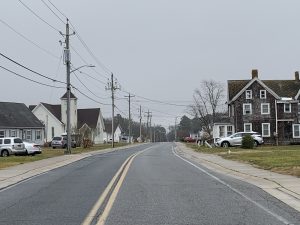
Residents asked the Planning Commission to not forget about Flower Street in the comprehensive plan for Berlin.
By Cindy Hoffman, Staff Writer
(Jan. 18, 2024) The Berlin Planning Commission held another listening session last Wednesday night to hear residents’ opinions on updating the comprehensive plan for the town.
The commission is responsible for updating the plan, which was last done in 2010. This plan, which is required by state law to be updated in 10-year increments, analyzes potential growth, infrastructure, housing, and other issues and the associated impacts through the year 2030. The plan’s purpose is to guide land use and development.
During the meeting, the commission members heard from residents about stormwater, trees and forest cover, affordable housing, connectivity, inclusivity, and sidewalks.
Council member Jack Orris asked the commission to include stormwater management in the updated comprehensive plan and listed numerous problem areas, including Burley, Broad, West and Abby streets.
“We don’t deal with stormwater management. It’s out of our realm of expertise,” Matt Stoehr, the vice chair of the commission said.
“We can be more proscriptive,” Dave Englehart, planning director for the Town of Berlin said. But the effort would have to be funded.
Commission member Ron Cascio agreed that it was a topic that needed more discussion and thought.
Some residents spoke out about the importance of protecting and planting trees in the town.
“I have seen us lose our forest cover in this town,” said Joan Maloof, who has lived in Berlin for six years and is the founder of the Old Growth Forest Network. She recommended that the town consider having an open space commission, and suggested it was possible to get grant funding.
She also suggested that Berlin have a tree ordinance that could require property owners to protect certain types or sizes of trees.
Pete Cosby suggested that they plant “monumental trees” along the roadways, especially on Flower Street, to make the roads seem “more people sized.”
“Flower Street could be made into a truly beautiful boulevard,” Cosby said.
Maloof has written five books on trees and is a professor emeritus at Salisbury University. She volunteered to lead an open space commission, with Cascio suggesting she should be used as a resource.
Tony Weeg advocated for walkability in the town, connecting both the east and west sides of town. When discussion of a bridge over Route 113 came up, Weeg and others in the audience did not think that was the answer to the issue.
“We should not let 113 divide us,” Diana Purnell said.
Purnell pushed for inclusivity, and asked the commission to include Flower Street in its plan update.
“Flower Street needs as much attention as Berlin proper. We are one historic town, one really neat historic place,” Purnell said.
As is the case throughout the area, affordable housing has been a big topic of conversation in Berlin, with not much movement on the subject. Adjacent dwelling units were an option that resident Marie Velong suggested.
Cosby liked the idea of “Fonzie” apartments, as he called them, referring to the apartment above a garage at the Cunningham’s home where the Fonz resided on the 1970s hit show “Happy Days.” He suggested they might be a way to solve some of the housing problems.
“We come up real short on affordable housing,” Gabe Purnell said. He suggested the commission consider increasing R3 zoning in the town to allow for more affordable housing. R3 housing allows for high density housing, such as apartment buildings and condominiums.
He said that people are telling him that rent is getting out of hand. But when Cosby suggested the town could consider rent controls and/or price controls on the sale of houses, members of the audience were not supportive.
The Planning Commission will continue to host public meetings on the comprehensive plan on the fourth Wednesday of every month for the next six months. Regular meetings will still be on the second Wednesday of each month.
